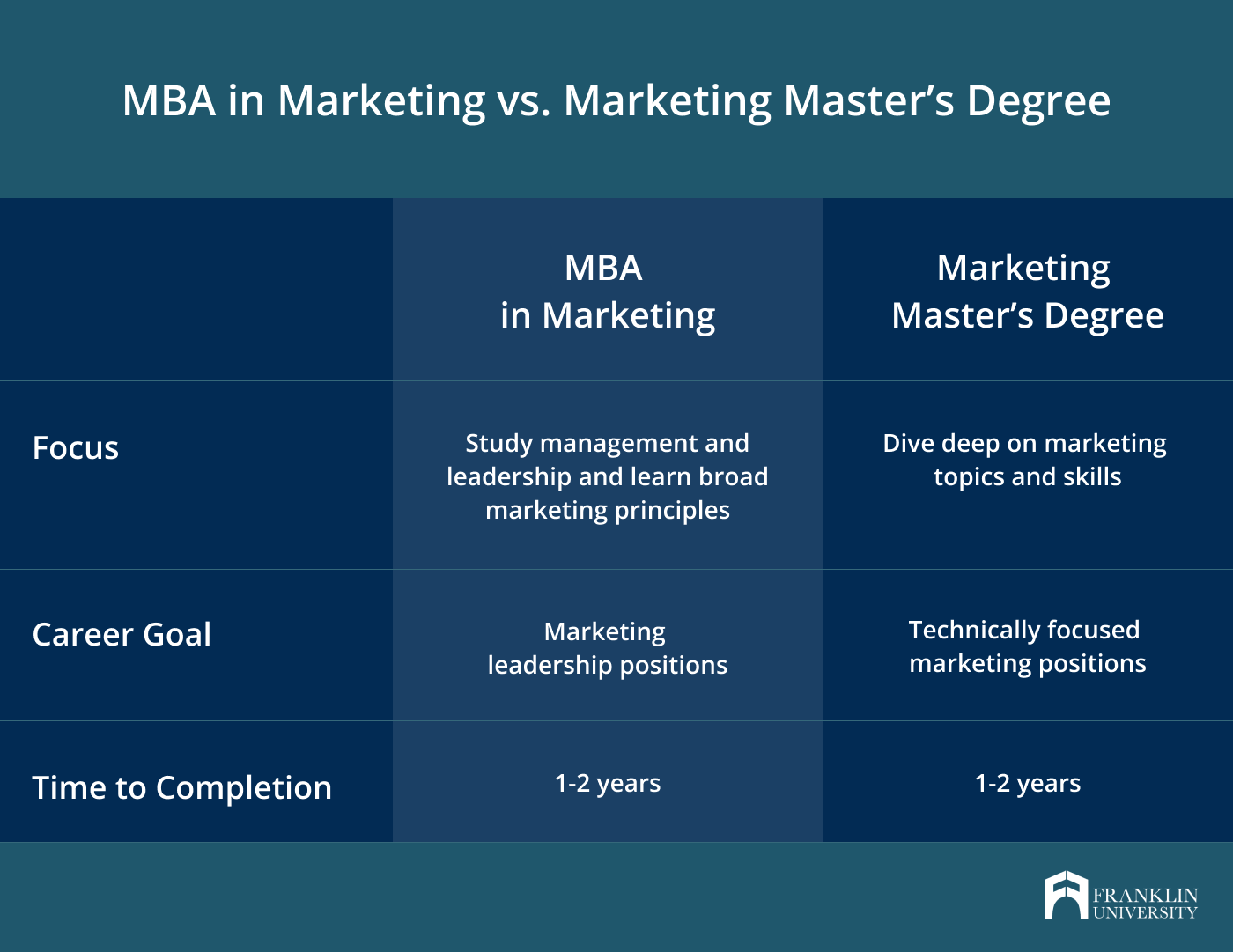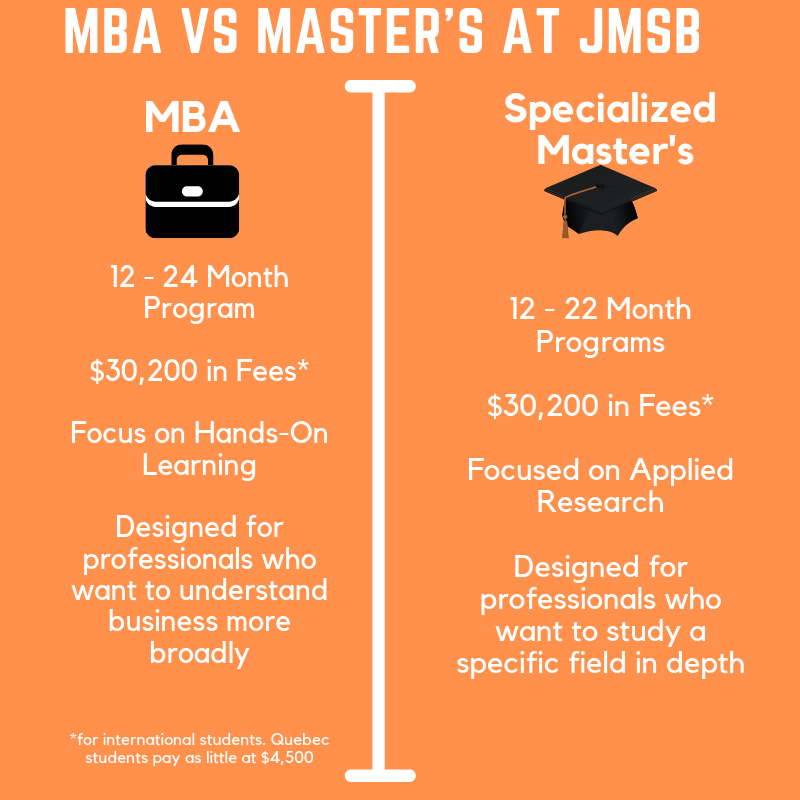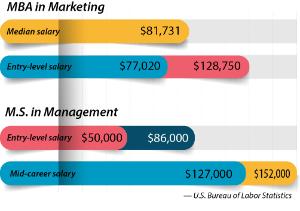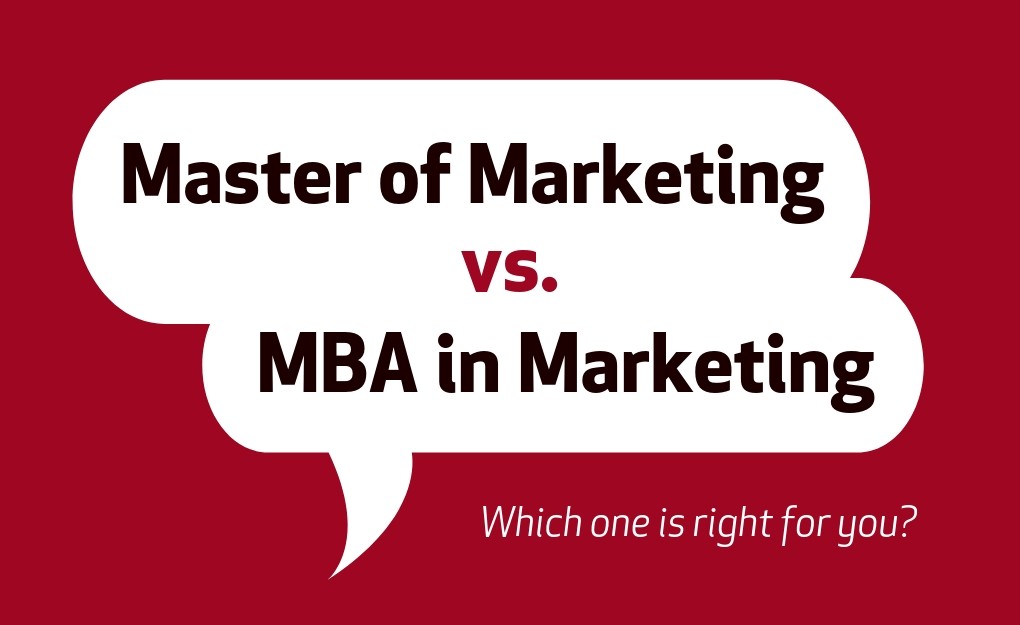- MBA or Masters (MS) in Marketing: Which is the Right Choice for You?
- Which is better, MBA in marketing or MS in marketing?
- Is an MBA or MS more valuable?
-
Is getting an MBA worth it for marketing?
- What Are the Benefits of an MBA for Marketing Professionals?
- How Does an MBA Enhance Career Prospects in Marketing?
- What Are the Financial Considerations of Pursuing an MBA for Marketing?
- What Are the Alternatives to an MBA for Marketing Professionals?
- How to Choose the Right MBA Program for Marketing?
- Which pays more, masters or MBA?
- Frequently Asked Questions from Our Community
Choosing between an MBA and a Master’s in Marketing (MS) is a pivotal decision for professionals aiming to advance their careers in the business world. While both degrees offer valuable insights into marketing strategies and management, they cater to different career goals and skill sets. An MBA provides a broad understanding of business operations, leadership, and strategy, making it ideal for those seeking managerial roles. On the other hand, an MS in Marketing focuses deeply on consumer behavior, data analysis, and specialized marketing techniques, appealing to those passionate about the field. Understanding the distinctions can help align your educational path with your professional aspirations.
MBA or Masters (MS) in Marketing: Which is the Right Choice for You?
When deciding between pursuing an MBA or a Master's (MS) in Marketing, it's essential to understand the differences, benefits, and career outcomes associated with each. Both programs offer unique advantages, but the right choice depends on your career goals, background, and aspirations. Below, we explore key aspects of both degrees to help you make an informed decision.
See Also To those who graduated college with marketing degrees - what are you doing now?
To those who graduated college with marketing degrees - what are you doing now?1. What is an MBA in Marketing?
An MBA in Marketing is a graduate-level business degree that combines core business administration courses with specialized marketing electives. This program is designed for individuals seeking leadership roles in marketing, business strategy, or general management. It emphasizes a broad understanding of business operations, including finance, operations, and human resources, alongside marketing principles.
2. What is a Master's (MS) in Marketing?
A Master's (MS) in Marketing is a specialized graduate degree focused exclusively on marketing concepts, strategies, and analytics. This program is ideal for those who want to deepen their expertise in areas like consumer behavior, digital marketing, market research, and brand management. Unlike an MBA, it does not cover broader business topics, making it more suitable for individuals committed to a marketing-focused career.
See Also Differences Between a Marketing Manager and a Brand Manager?
Differences Between a Marketing Manager and a Brand Manager?3. Career Opportunities: MBA vs. MS in Marketing
The career paths for graduates of these programs differ significantly. An MBA in Marketing prepares you for leadership roles such as Marketing Manager, Brand Manager, or even Chief Marketing Officer (CMO). On the other hand, an MS in Marketing is more suited for specialized roles like Market Research Analyst, Digital Marketing Specialist, or Product Manager.
| Degree | Common Career Paths |
|---|---|
| MBA in Marketing | Marketing Manager, Brand Manager, CMO |
| MS in Marketing | Market Research Analyst, Digital Marketing Specialist, Product Manager |
4. Curriculum Comparison: MBA vs. MS in Marketing
The curriculum of an MBA in Marketing includes a mix of general business courses and marketing electives. Topics may include Financial Management, Strategic Leadership, and Consumer Behavior. In contrast, an MS in Marketing focuses solely on marketing-related subjects, such as Digital Marketing Strategies, Data Analytics, and Brand Management.
See Also What Constitutes a White Paper? How Does It Differ From a Blog Post, eBook, or Case Study?
What Constitutes a White Paper? How Does It Differ From a Blog Post, eBook, or Case Study?5. Which Degree is Right for You?
Choosing between an MBA and an MS in Marketing depends on your career goals. If you aspire to hold leadership positions and want a broad understanding of business operations, an MBA is the better choice. However, if you are passionate about marketing and want to specialize in this field, an MS in Marketing will provide the depth of knowledge you need. Consider your long-term career aspirations, industry preferences, and educational background before making a decision.
Which is better, MBA in marketing or MS in marketing?

 Those That Graduated With a Marketing Degree, What Are You Doing Now?
Those That Graduated With a Marketing Degree, What Are You Doing Now?What is the Difference Between an MBA in Marketing and an MS in Marketing?
An MBA in Marketing is a broader business degree that covers various aspects of business administration, including finance, operations, and leadership, with a focus on marketing. On the other hand, an MS in Marketing is a specialized degree that delves deeply into marketing theories, consumer behavior, and data analysis. The key differences are:
- Scope: MBA programs offer a comprehensive business education, while MS programs focus exclusively on marketing.
- Career Goals: An MBA is ideal for those seeking leadership or managerial roles, whereas an MS is better for those aiming for specialized marketing positions.
- Curriculum: MBA programs include general business courses, while MS programs emphasize advanced marketing techniques and research.
Who Should Pursue an MBA in Marketing?
An MBA in Marketing is suitable for individuals who want to develop a broad understanding of business operations while specializing in marketing. This degree is ideal for:
See Also What Are Your Salary Expectations? How to Answer This Question
What Are Your Salary Expectations? How to Answer This Question- Aspiring Managers: Those aiming for leadership or executive roles in marketing or other business functions.
- Career Switchers: Professionals transitioning from non-business fields who need a comprehensive business education.
- Entrepreneurs: Individuals planning to start their own business and require a well-rounded skill set.
Who Should Pursue an MS in Marketing?
An MS in Marketing is designed for individuals who want to specialize in marketing and gain in-depth knowledge of the field. This degree is ideal for:
- Marketing Enthusiasts: Those passionate about marketing and seeking advanced expertise in areas like digital marketing, consumer behavior, or market research.
- Recent Graduates: Individuals with a bachelor's degree in marketing or a related field who want to deepen their knowledge.
- Data-Driven Professionals: Those interested in leveraging data analytics and research to drive marketing strategies.
What Are the Career Opportunities for MBA in Marketing Graduates?
Graduates with an MBA in Marketing have access to a wide range of career opportunities, including:
- Marketing Manager: Overseeing marketing campaigns and strategies for organizations.
- Brand Manager: Managing and developing brand identity and positioning.
- Business Development Manager: Identifying growth opportunities and building client relationships.
What Are the Career Opportunities for MS in Marketing Graduates?
Graduates with an MS in Marketing can pursue specialized roles in the marketing field, such as:
- Market Research Analyst: Analyzing market trends and consumer behavior to guide marketing strategies.
- Digital Marketing Specialist: Managing online marketing campaigns and optimizing digital channels.
- Product Manager: Overseeing the development and marketing of specific products or services.
Is an MBA or MS more valuable?

What is the Difference Between an MBA and an MS?
An MBA (Master of Business Administration) and an MS (Master of Science) are both advanced degrees, but they serve different purposes. An MBA focuses on business management, leadership, and strategic decision-making, making it ideal for those aiming for executive or managerial roles. On the other hand, an MS is a specialized degree that delves into technical, scientific, or research-oriented fields, such as engineering, computer science, or data analytics. The choice depends on your career goals and interests.
- MBA: Broad focus on business and management.
- MS: Specialized focus on technical or scientific fields.
- Career Path: MBA for leadership roles, MS for technical expertise.
Which Degree Offers Better Career Opportunities?
The value of an MBA versus an MS in terms of career opportunities depends on the industry and role. An MBA is highly valued in corporate leadership, consulting, and entrepreneurship, offering access to high-paying managerial positions. An MS, however, is more suited for roles requiring technical expertise, research, or innovation, such as in technology, engineering, or healthcare. Both degrees can lead to lucrative careers, but the opportunities differ based on specialization.
- MBA: Ideal for corporate and entrepreneurial roles.
- MS: Best for technical and research-oriented careers.
- Industry Demand: MBA in business sectors, MS in STEM fields.
How Do Salaries Compare Between MBA and MS Graduates?
Salaries for MBA and MS graduates vary significantly based on the industry, role, and location. Generally, MBA graduates tend to earn higher salaries in management and executive positions, especially in finance, consulting, and technology. MS graduates often command competitive salaries in technical roles, such as data scientists, engineers, or researchers. However, the earning potential for both degrees can overlap in industries like technology, where leadership and technical skills are equally valued.
- MBA: Higher salaries in leadership and consulting roles.
- MS: Competitive pay in technical and research positions.
- Overlap: Technology sector values both degrees equally.
What Are the Admission Requirements for an MBA vs. an MS?
Admission requirements for an MBA and an MS differ based on the program's focus. MBA programs typically require work experience, GMAT/GRE scores, and strong leadership potential. They also emphasize essays, interviews, and recommendations. MS programs, on the other hand, prioritize academic performance, GRE scores (for some fields), and a strong background in the chosen discipline. Research experience and technical skills are often critical for MS admissions.
- MBA: Work experience, GMAT/GRE, leadership qualities.
- MS: Academic excellence, GRE, technical background.
- Focus: MBA on leadership, MS on technical expertise.
Which Degree is More Valuable for Entrepreneurs?
For entrepreneurs, the value of an MBA versus an MS depends on the nature of their business. An MBA provides business acumen, networking opportunities, and strategic thinking, which are crucial for scaling a business. An MS, however, is more beneficial for entrepreneurs in technology-driven or innovation-focused industries, as it offers deep technical knowledge and problem-solving skills. Both degrees can complement each other, but the choice depends on the entrepreneur's goals.
- MBA: Business strategy and networking for entrepreneurs.
- MS: Technical expertise for innovation-driven ventures.
- Combination: Both degrees can enhance entrepreneurial success.
Is getting an MBA worth it for marketing?

What Are the Benefits of an MBA for Marketing Professionals?
An MBA can provide marketing professionals with a range of benefits, including advanced knowledge, leadership skills, and networking opportunities. Here are some key advantages:
- Advanced Knowledge: An MBA program often includes specialized courses in marketing strategy, consumer behavior, and data analytics, which can enhance your expertise.
- Leadership Skills: MBA programs focus on developing leadership and management skills, which are crucial for advancing to senior marketing roles.
- Networking Opportunities: MBA programs offer access to a network of peers, alumni, and industry professionals, which can open doors to new career opportunities.
How Does an MBA Enhance Career Prospects in Marketing?
An MBA can significantly enhance your career prospects in marketing by providing you with the skills and credentials needed to stand out in a competitive job market. Here’s how:
- Higher Earning Potential: MBA graduates often command higher salaries compared to those with only a bachelor’s degree.
- Career Advancement: An MBA can prepare you for leadership roles such as Marketing Director, Chief Marketing Officer (CMO), or even CEO.
- Versatility: The broad business education from an MBA allows you to transition into various industries or roles within marketing.
What Are the Financial Considerations of Pursuing an MBA for Marketing?
Pursuing an MBA is a significant financial investment, and it’s important to weigh the costs against the potential benefits. Consider the following:
- Tuition Costs: MBA programs can be expensive, with tuition fees ranging from $50,000 to over $100,000.
- Opportunity Cost: Taking time off work to pursue an MBA means losing out on potential earnings during that period.
- Return on Investment (ROI): Evaluate whether the potential salary increase and career advancement opportunities justify the cost of the program.
What Are the Alternatives to an MBA for Marketing Professionals?
If an MBA is not the right fit for you, there are alternative paths to advance your marketing career. Consider these options:
- Specialized Certifications: Certifications in digital marketing, data analytics, or brand management can provide targeted skills.
- Online Courses: Platforms like Coursera, Udemy, and LinkedIn Learning offer affordable courses in various marketing disciplines.
- Industry Experience: Gaining hands-on experience and building a strong portfolio can sometimes be as valuable as an MBA.
How to Choose the Right MBA Program for Marketing?
Selecting the right MBA program is crucial for maximizing the benefits for your marketing career. Here are some factors to consider:
- Specialization: Look for programs that offer a concentration in marketing or related fields.
- Reputation: Consider the reputation of the business school and its alumni network in the marketing industry.
- Flexibility: Evaluate whether the program offers part-time, online, or executive options to fit your schedule and career goals.
Which pays more, masters or MBA?

Salary Comparison: Masters vs. MBA
When comparing salaries, an MBA (Master of Business Administration) generally tends to pay more than a specialized master's degree in fields like engineering, arts, or sciences. This is because an MBA is designed to prepare individuals for leadership and managerial roles, which often come with higher compensation packages. However, the salary difference depends on factors such as industry, location, and experience.
- MBA graduates often earn higher starting salaries due to the program's focus on business strategy and management.
- Specialized master's degrees may offer competitive salaries in high-demand fields like technology or healthcare.
- The earning potential for both degrees increases with experience and industry demand.
Industry-Specific Earnings for Masters and MBA Graduates
Certain industries favor one degree over the other in terms of salary. For example, MBA graduates typically excel in finance, consulting, and corporate management, where salaries can exceed $100,000 annually. On the other hand, specialized master's degrees in fields like computer science or data science can also command high salaries, especially in tech-driven industries.
- Finance and consulting industries often prefer MBA graduates for high-paying roles.
- Tech and engineering sectors may offer higher salaries to those with specialized master's degrees.
- Industry demand and skill scarcity play a significant role in determining salary levels.
Geographic Influence on Salary Differences
Geographic location significantly impacts the salary differences between MBA and master's degree holders. For instance, MBA graduates in cities like New York or San Francisco often earn more due to the concentration of corporate headquarters and financial institutions. Similarly, specialized master's degree holders may find higher salaries in regions with a strong presence of tech companies or research institutions.
- Urban areas with corporate hubs tend to offer higher salaries for MBA graduates.
- Regions with a strong tech or research presence may favor specialized master's degree holders.
- Cost of living in a location can also influence salary levels for both degrees.
Experience and Career Growth Impact
While starting salaries for MBA graduates are often higher, the long-term earning potential for both degrees depends on career growth and experience. MBA holders may advance quickly into executive roles, while specialized master's degree holders may see significant salary increases as they gain expertise in their field.
- MBA graduates often have faster career progression into leadership roles.
- Specialized master's degree holders may see salary growth with technical expertise and experience.
- Networking and industry connections can further enhance earning potential for both degrees.
Return on Investment (ROI) for Masters and MBA Programs
The ROI of an MBA versus a specialized master's degree depends on factors like program cost, duration, and salary outcomes. MBA programs are often more expensive but can yield higher salaries, making the ROI favorable for many. Specialized master's programs may have lower upfront costs and still offer strong ROI in high-demand fields.
- MBA programs typically have higher tuition fees but can lead to higher-paying roles.
- Specialized master's programs may offer quicker ROI in fields with high demand and lower program costs.
- Scholarships and employer sponsorships can improve ROI for both degrees.
Frequently Asked Questions from Our Community
What is the difference between an MBA and a Master's (MS) in Marketing?
An MBA (Master of Business Administration) with a focus on marketing provides a broad understanding of business management, including finance, operations, and strategy, while also covering marketing principles. On the other hand, a Master's in Marketing (MS) is a specialized degree that delves deeply into marketing-specific topics such as consumer behavior, digital marketing, and brand management. The MBA is ideal for those seeking leadership roles across various business functions, whereas the MS in Marketing is better suited for individuals aiming to become experts in the marketing field.
Which degree is better for career advancement: MBA or MS in Marketing?
The choice between an MBA and an MS in Marketing depends on your career goals. If you aspire to hold leadership or managerial positions in diverse industries, an MBA is often more advantageous due to its comprehensive business curriculum. However, if your goal is to specialize in marketing and advance in roles such as marketing manager, brand strategist, or digital marketing expert, an MS in Marketing may be more beneficial. Both degrees can enhance career prospects, but the MBA offers broader opportunities, while the MS provides deeper expertise in marketing.
Can I switch careers with an MBA or MS in Marketing?
Yes, both degrees can facilitate a career switch, but they serve different purposes. An MBA is particularly effective for career changers because it equips you with a wide range of business skills applicable across industries. If you are transitioning into marketing from a non-business background, an MBA with a marketing concentration can provide the necessary foundation. Conversely, an MS in Marketing is more suitable if you are already in a business-related field and want to pivot specifically into marketing roles, as it offers specialized knowledge and skills tailored to the marketing industry.
How do the costs and duration of an MBA compare to an MS in Marketing?
An MBA program typically lasts 1-2 years and can be more expensive due to its comprehensive curriculum and the prestige associated with business schools. In contrast, an MS in Marketing often takes 1-1.5 years to complete and may be less costly, depending on the institution. However, the return on investment (ROI) for an MBA can be higher for those pursuing leadership roles, while the MS in Marketing may offer a quicker and more cost-effective path for those focused solely on marketing careers. It's essential to evaluate your career goals and financial situation when deciding between the two.
Leave a Reply


Articles of interest